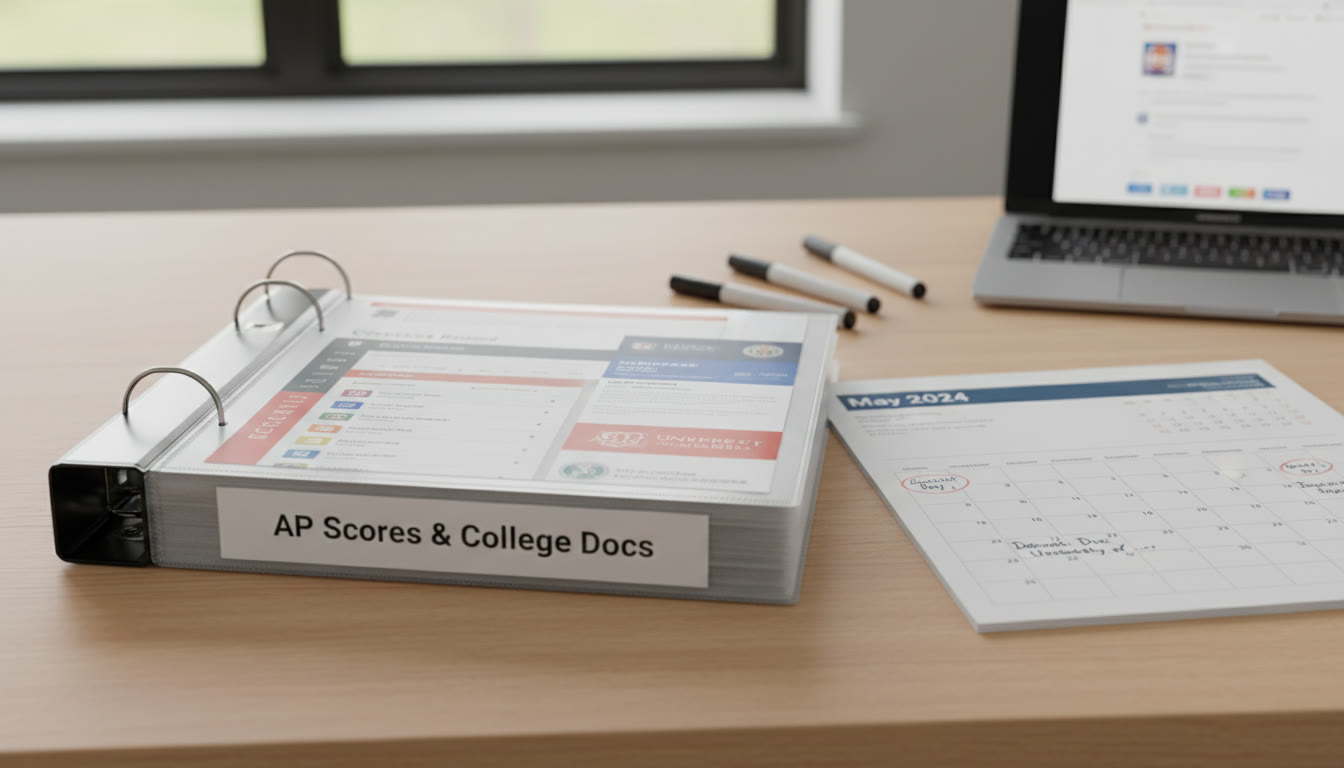When Scores Don’t Show Up on Time: Why This Feels Like a Crisis—and How to Breathe
It happens: you refresh the College Board account, check the email, and the AP scores your child studied for all spring come back later than expected. For parents, that lag can feel catastrophic—especially when college application or credit deadline clocks are ticking. Take a breath. Late AP score arrival is stressful but usually manageable with a calm, practical plan.
Why AP Scores Can Arrive Late
Before we jump to solutions, it helps to know a few typical reasons scores run late. Understanding the cause makes mitigation more targeted and far less panicked.
- Processing volume: Millions of exams are scored each year. High volume or an unusually heavy exam day can slow things down.
- Answer booklet issues: If an answer booklet is flagged—poor scan quality, stray marks, or other anomalies—it may be routed for manual review.
- Administrative delays: Logistical hiccups—shipping, scanning center backlogs, or personnel constraints—can push timelines.
- Score reporting cycles: Colleges and institutions sometimes have their own internal windows for receiving or posting scores.

Immediate Steps to Take the Moment You Notice a Delay
Acting quickly and methodically helps protect application opportunities and reduces stress for your student. The first hour after realizing scores are late is often the most important.
1. Confirm Deadlines—Be Precise
Gather absolute dates. Don’t rely on memory or relative terms like “soon” or “next week.” Identify:
- College application deadlines (Early Decision, Early Action, Regular Decision) with exact dates and times.
- Scholarship or program deadlines that require AP scores for credit or placement.
- AP credit/placement submission deadlines at the specific colleges your child is targeting.
Write these down in one place and prioritize them. If a deadline is two days away and scores are missing, the response differs from a delay with a month until the deadline.
2. Check Official Score Release Windows and Notifications
Log into your child’s College Board account and review any posted updates, official release timelines, or messages. If the account shows the scores as “pending” or “under review,” document the status and timestamp it (screenshot if helpful). Keep that evidence safe; it’s useful if you need to contact a college or scholarship committee.
3. Communicate Proactively—but Calmly—with Target Colleges
If a college deadline requires AP scores, email the admissions office right away. Keep messages short and factual: identify the applicant, the exam, the expected release date (if known), and attach a screenshot of the College Board status if possible. Ask whether they will accept a test-date attestation or whether an unofficial score report (screenshot) will suffice temporarily.
Admissions offices are used to these issues; many will accept a short delay explanation or allow submission of unofficial documentation until official scores arrive. The key is proactive, documented communication.
Short-Term Workarounds While You Wait
Not every delayed score threatens an entire application cycle. Use these steps to keep momentum.
Unofficial Score Documentation
Some colleges will accept an unofficial score report—such as a screenshot of the College Board account—while waiting for an official transcript. When you send such documentation, include:
- Student name exactly as used on the application.
- Student ID or College Board number.
- Test name and exam date.
- Timestamp and explanation that the official score is pending.
Letter from the School Counselor
A short note from the high school counselor confirming the student took the AP exam and that scores are pending can add credibility. Counselors can also document any extenuating circumstances, such as illness around test day, which sometimes helps.
Request an Extension Where Appropriate
Deadlines are sometimes flexible—especially for documentation rather than the application itself. When requesting an extension, keep the request polite, concise, and specific (e.g., “Requesting a one-week extension to submit official AP scores due to processing delay”). Explain how you’ll follow up and provide proof that scores are pending.
Medium-Term Steps If Scores Remain Delayed
If the delay persists beyond a few weeks, broaden your approach. This is where paperwork, escalation, and alternate plans matter.
1. Contact College Board Support
College Board has channels for score inquiries. When you call or message, have this information handy:
- Student name and College Board account number.
- Exact AP exam(s) and test date(s).
- Any screenshots showing pending or problematic status.
- Contact information and the deadline you’re trying to meet.
Ask for a case number and expected timeline—and write these down. A polite but persistent follow-up schedule (e.g., every 3–4 business days) keeps your request visible without becoming adversarial.
2. Escalate with Documentation
If standard support channels are slow, escalate thoughtfully:
- Ask support for escalation criteria and expected turnaround.
- If the score was delayed due to scanning or manual review, request documentation indicating the review is underway.
- Keep a single document tracking dates, contacts, case numbers, and outcomes so nothing slips through the cracks.
3. Use College-Specific Policies to Your Advantage
Different colleges treat AP scores differently: some prioritize the application file even without official scores and will update the record later; others may need scores for scholarship or placement decisions. Revisit each college’s policy and ask targeted questions. Many admissions teams treat AP score delays as routine if they are notified early.
When Scores Never Arrive in Time: Backup Plans
Sometimes, despite best efforts, official scores don’t make a deadline. Have backup strategies that preserve opportunity and morale.
1. Emphasize Other Parts of the Application
Support your child in sharpening other application elements that can offset one missing data point:
- Polish personal statements and short answers to tell a strong story.
- Secure additional letters of recommendation that speak to academic readiness in the exam subject.
- Provide transcripts showing advanced coursework or high grades in relevant classes.
2. Consider Alternative Credit or Placement Evidence
If AP credit or placement is the issue, colleges may accept other evidence for placement, such as departmental exams taken after matriculation, placement essays, or a strong performance in introductory coursework. Explore these options with each college’s registrar or department.
3. Reassess Course Planning
If missing AP credit could affect senior-year scheduling, plan adjustments early. Advisors can craft substitute courses that keep graduation and major-prep on track.
Practical Timeline Cheat-Sheet
Below is a compact table you can print and keep when managing a delayed score situation. It helps prioritize actions based on how close you are to a deadline.
| Time Before Deadline | Priority Actions | Who Should Lead |
|---|---|---|
| > 3 Weeks | Confirm deadlines; notify colleges with screenshot; request provisional acceptance of unofficial scores. | Parent + Student |
| 1–3 Weeks | Contact College Board support; get a case number; ask counselor for supporting letter. | Parent / Counselor |
| < 1 Week | Escalate with admissions offices; request short extension; provide unofficial documentation. | Parent + Student |
| After Deadline | Submit stronger application materials; arrange for placement exams or departmental review post-enrollment. | Student + Counselor |
Emotional Support: Helping Your Teen Stay Confident
Delays can be demoralizing—especially after months of effort. Keep focus on long-term goals and daily resilience.
Reassure and Reframe
Empathize with disappointment, then reframe: a delayed score is usually a logistical problem, not a reflection of your child’s abilities. Reinforce that admissions teams evaluate the whole student, not a single test result.
Maintain Routine
Encourage your child to continue constructive activities: finish senior essays, prepare for interviews, and, if applicable, continue tutoring or subject study. Small, steady wins restore control and momentum.
How Targeted Support Can Make a Difference
When time is short, targeted help matters. This is where one-on-one guidance, tailored study plans, and expert tutors can keep a student academically prepared and mentally steady.
Why Personalized Tutoring Helps During Delays
Personalized tutoring does more than fill knowledge gaps. It can:
- Refine college essays and application narratives so other parts of the profile shine.
- Help students prepare departmental placement exams that many colleges offer upon arrival.
- Provide practice, confidence, and coping strategies while waiting for official score resolution.
Sparkl’s personalized tutoring, for example, pairs students with experts who craft tailored study plans, course-correct weak spots, and offer AI-driven insights to pinpoint efficient improvement—support that matters when deadlines loom.
Real-World Examples: What Worked for Other Families
These illustrative scenarios show common pathways parents have used successfully.
Case A: Early Action, Scores Delayed by Two Weeks
The family notified the admissions office immediately and attached a screenshot showing “pending” status. The admissions office accepted the application and noted that official scores could be added later. The student received the expected decision on time.
Case B: Scores Delayed, Scholarship Deadline Approaching
A counselor wrote a brief confirmation letter and the family submitted unofficial documentation. The scholarship committee granted a short extension pending official reporting, and the student ultimately received the award.
Case C: Scores Delayed Into Fall—Departmental Placement Needed
After the scores didn’t arrive before matriculation, the student took a departmental placement exam offered by the university and placed into an advanced course. The student’s AP preparation still paid off, just via a different route.
Checklist: Documents and Info to Keep Ready
Store these items in a single, easily accessible folder (digital and printed) so you can act quickly.
- College Board account screenshot(s) showing pending status with timestamp.
- Student’s College Board ID and test registration details.
- Application deadlines and contact emails for each college’s admissions office.
- Counselor letter template and contact info for quick requests.
- Case numbers and notes from College Board support conversations.

Preventive Measures for Future Exam Seasons
While you can’t control every delay, you can lower the stakes next time. Consider these preventive steps:
- Encourage the student to self-report unofficial scores early when allowed by colleges.
- Keep critical deadlines well documented and add buffer time when possible.
- Build redundancy: have the counselor ready to confirm exam participation.
- Explore early placement exams or internal college policies to understand alternate routes.
When to Consider Filing a Formal Complaint
Most delays are benign, but if you suspect mishandling—lost materials, failure to process despite documented proof, or repeated issues—ask College Board support for next steps and consider escalating. Keep the tone factual and focused on resolution rather than blame.
Final Thoughts: Turn Delay Into a Strategic Moment
Late AP score arrival can be unnerving, but with a calm plan—clear deadlines, proactive communication, documentation, and targeted academic support—you can protect your child’s application and keep stress manageable. Remind your teen that admissions processes are human systems and often flexible: the way they respond to setbacks is as important as the scores themselves.
If you’d like practical help sharpening what’s under your control—application essays, placement prep, or a tailored study plan—consider one-on-one tutoring with experts who can provide focused support and AI-driven insights to make the most of the time you have. A smart, personalized plan can turn a delay into a learning opportunity and a competitive edge.
Quick Recap: Your 7-Step Action Plan
- Confirm exact deadlines for each college or program.
- Document the score status with screenshots and timestamps.
- Notify admissions offices and request acceptance of unofficial documentation if needed.
- Ask the counselor for a confirming letter.
- Contact College Board support and track a case number.
- Escalate thoughtfully if delays persist; explore placement exam options.
- Strengthen other application areas and consider targeted tutoring for focused improvement.
Delays are a logistical challenge, not a verdict. With the right mix of organization, communication, and targeted support, your child can still arrive at college ready—and you can keep leading the charge calmly and confidently.
Wishing you steady nerves and clear next steps—one organized action at a time.

















No Comments
Leave a comment Cancel